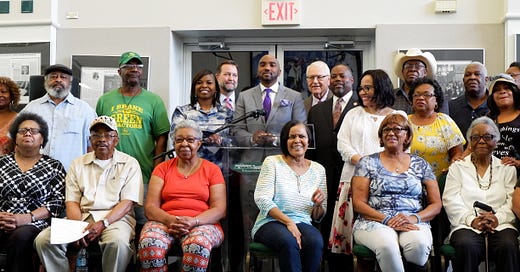I’m not Black, I’m Freedmen!
Supreme Court Enforces Native Citizenship for Descendants of Creek Freedmen Slaves
The Supreme Court ruled the descendants of Black slaves, the Creek Freedmen, are entitled to Native citizenship within the Muscogee Creek Nation. The decision to acknowledge the historical and cultural ties between the Native nations and the slave trade has far-reaching implications. The tie that binds these individuals is underscoring a commitment to rectify historical injustices.
Background: The Five Civilized Tribes and the Civil War
The Civil War presented a complex scenario for the Native American tribes, with the Choctaw and Chickasaw Nations supporting the Confederacy, while the Cherokee, Muscogee (Creek), and Seminole Nations had troops fighting on both sides. The withdrawal of Union soldiers from Indian Territory exposed the tribes to violence from the Confederacy and Plain Indians. After the formerly enslaved colored Union soldiers won the Civil War, the tribes signed a series of Reconstruction Treaties, those treaties set the stage for today’s acknowledgment of Freedmen's rights and citizenship.
The 1866 Treaty and Native Citizenship
The crux of the Supreme Court's decision lies in the 1866 Treaty, which clearly entitles Freedmen – descendants of those enslaved by the Muscogee Nation – to native citizenship. The ruling emphasizes that the Five “Civilized” Native Nations cannot selectively invalidate portions of the treaty. They must all recognize the rights of Freedmen including the Creek Freedmen.
The decision to exclude Freedmen from native citizenship was rooted in the foundational pillar of slavery - the racist notion that people with dark skin are the subordinate class with intellectual inferiority.
Legacy of Slavery and Economic Injustice
In the June 2023 Supreme Court ruling on affirmative action Justice Harlan's dissent highlighted concrete evidence of the Court's historical betrayals. Government-sponsored destruction, betrayal, and treason prevented former slaves from building wealth. Former slaves were forced into roles that perpetuated cycles of debt and economic hardship (drug dealers, crackheads, juvenile delinquents, etc).
"..there were some 10,000 or 12,000 negroes in the five nations,....Those negroes were held as slaves, and were the subjects of barter and sale as were the same class in the States of the south."
Mr. T. J. Mackey
Washington, May 19, 1866
Why This Matters
The Supreme Court's identification of Freedmen as Native citizens has immediate and long-term consequences. As more individuals discover their Freedmen heritage, political dynamics are set to shift, influencing the allocation of resources and funding. Cherokee Freedmen became eligible for benefits in 2021. The Office of Management and Budget is expected to update the categories for Blacks in the coming years. From now on, foreign-born Africans, their descendants, and their families are separate from those who were enslaved in the United States. The separation reflects the nuanced understanding of the term “African-American” and its history.
Evolution of Identity and Social Implications
The recognition of Freedmen by the Supreme Court marks a transformative moment for the global Black community. The story about the Trans-Atlantic Slave Trade is being reexamined and retold from the point of view of those who were colonized. Not the colonizer.
Thanks to advancements in digital technology researching one's slave ancestors is now easier and more accessible than ever. As the Freedmen community gains visibility, and the eligibility for benefits changes, we anticipate more individuals will discover their Freedmen ethnicity as we approach election season for 2024.
Disaggregated Data and Policy Implications
Government courts, divisions, and agencies are now obligated to adhere to the language direction of the Native nations and embrace the rights of Freedmen Creek and their descendants. Disaggregated data will be crucial in allocating program benefits and initiatives to address historical injustices.
Conclusion: A Step Towards Justice
The Supreme Court's decision in favor of Creek Freedmen's Native citizenship is a significant step towards rectifying the historical injustices of all former slaves because it finally acknowledges the cultural and historical ties between the natives and slaves. Once a rumor whispered throughout the black American community this ruling sets a legal precedent for addressing the neglected economic and social obligations as a result of slavery - the biological, cultural, and historical connection between slaves and natives. This year the nation will grapple with its past because the descendants of the enslaved are rewriting the story of their identity. The evolution of justice continues to shape the future.
WATCH ON YOUTUBE







Check out my post called, “The Elephant in the Room is White”.